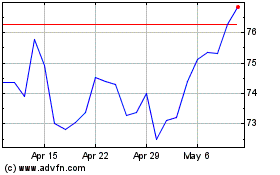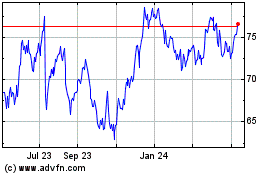State Street Nears Settlements to End Probes Into Alleged Overcharges -- Update
May 16 2016 - 12:06PM
Dow Jones News
By Aruna Viswanatha
State Street Corp. is nearing a deal to pay more than $500
million to end long-running investigations from federal authorities
and others into allegations that the custody bank unlawfully
overcharged clients on foreign currency transactions, according to
people familiar with the matter.
The settlement, which could be announced this summer, is
expected to resolve claims from the U.S. Justice and Labor
departments and the Securities and Exchange Commission, as well as
lawsuits from clients including pension funds, these people
said.
The lawsuits accuse State Street of promising to execute foreign
exchange trades for clients at market prices, but instead using
inaccurate or fake rates that included hidden markups. The alleged
overcharges occurred between 1998 and 2009, according to the
lawsuits.
Earlier this month, State Street said in a securities filing it
had set aside $565 million to resolve related claims. But the deal
has been held up as the Justice Department and the bank work on a
statement of facts that the bank will admit to, people familiar
with the talks said.
In June 2015, the bank disclosed it set aside $585 million to
cover all of the claims. In November, it quietly entered into a
related $13 million settlement with the California Attorney
General's office, according to a copy of the agreement.
State Street said in a statement that "settlement agreements
have not been finalized," but it believes that the money it has set
aside will resolve the claims and investigations. "Matters of this
nature can drain both time and resources; so where possible and
appropriate we feel it is in State Street's and our clients' best
interests to pursue settlements, " the bank said.
In a May 6 filing and in the statement Monday, State Street said
that "although we believe this recorded legal accrual will address
the financial demands associated with these claims, significant
nonfinancial terms remain outstanding." Those terms include the
admissions, the people said.
Last year, the world's largest custody bank, Bank of New York
Mellon, paid $714 million to resolve similar allegations from
federal and state authorities and clients.
As in the BNY case, the Justice Department is expected to bring
civil fraud claims against State Street under the Financial
Institutions Reform, Recovery, and Enforcement Act, the people
said.
The private cases had been put on hold in January 2015 as the
bank sought to reach a settlement with the plaintiffs and
regulators.
The allegations first came to light when the California attorney
general's office joined a whistleblower lawsuit in 2009 that
accused State Street of defrauding California pension funds Calpers
and CalSTERS through overcharging on currency trades, despite being
obligated to charge the rate at the time of the trade. Under the
November settlement, the California funds kept State Street as
their custodian and renegotiated some existing contracts. State
Street denied it had made any misrepresentations about its foreign
exchange transactions or violated California law.
Behind BNY Mellon, State Street is the second largest custodian
bank, safeguarding about $27 trillion in assets for money managers,
companies and other clients, and performing administrative
functions on behalf of other banks and corporations. It is also an
investment manager, with $2.3 trillion in assets under
management.
The investigations have been conducted by the U.S. attorney's
office in Boston as well as the Boston regional offices of the
Department of Labor and the Securities and Exchange Commission.
The Labor Department is involved because many of the allegedly
defrauded clients include retirement plans.
The Labor Department didn't respond to a request for comment.
The U.S. attorney's office and the SEC declined to comment.
The issue involves so-called standing instruction, foreign
exchange programs under which customers who require frequent
currency transactions don't negotiate each trade but rely on the
bank to execute them on their behalf.
State Street has faced a series of cases in recent months that
involved overbilling allegations. Last month, federal prosecutors
charged two former senior executives of the bank with secretly
adding commissions on billions of dollars in securities trades,
including for Irish and British pension funds and a Middle Eastern
sovereign-wealth fund.
Also in April, Massachusetts state regulators accused State
Street of overbilling clients for 18 years by including concealed
markups on services billed as out-of-pocket expenses. In one
example the regulator cited, State Street allegedly charged 20
times more than it cost the bank to process messages through the
Society for Worldwide Interbank Financial Telecommunication or
Swift, the international interbank messaging system.
"We charge our clients $5.00 per message -- an exorbitant mark
up that will certainly piss off clients when they figure this out,"
one employee wrote in a document emailed in 2009, according to the
administrative complaint filed by Massachusetts Secretary of State
William Galvin.
Write to Aruna Viswanatha at Aruna.Viswanatha@wsj.com
(END) Dow Jones Newswires
May 16, 2016 11:51 ET (15:51 GMT)
Copyright (c) 2016 Dow Jones & Company, Inc.
State Street (NYSE:STT)
Historical Stock Chart
From Jul 2024 to Aug 2024

State Street (NYSE:STT)
Historical Stock Chart
From Aug 2023 to Aug 2024
